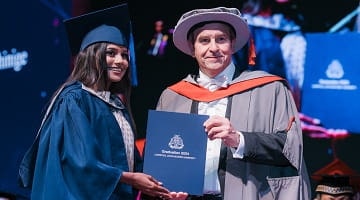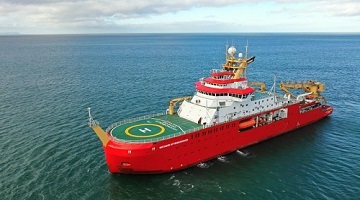About this course
LJMU's long history of high quality masters teaching in Marine and Offshore Engineering will ensure you are prepared for a successful career in this growing industry.
- Study at one of the UK's leading Maritime Schools
- Follow a curriculum accredited by the Institution of Mechanical Engineers (IMechE)
- Meet Chartered Engineer requirements
- Benefit from close industry links and excellent career prospects
This MSc programme provides the engineering skills and techniques you need to work as a specialist in the marine and offshore engineering field. On graduation you will be able to make an immediate contribution to a company's capability and operation, and progress into senior management positions.
The course combines substantial marine modules with mechanical engineering options to produce a bespoke skills learning set. It capitalises on the demand for highly qualified postgraduates and maintains LJMU's longstanding reputation for meeting the needs of the maritime industry.
Studying alongside students from all over the world you will learn about: safety analysis, design engineering, structural analysis, maritime law and regulation, quality systems and alternative energy systems. Two pathways offer the ability to tailor the degree depending on the preferred industry sector.
Our highly qualified and respected academic team combine specialist knowledge with relevant industrial experience. This combination of academic and professional expertise, as well as our well-established links with the industry and the worldwide maritime research sector, will help to ensure that you are well prepared to meet the opportunities and challenges of this vibrant and expanding sector.
For those with existing industry experience and relevant qualification, the programme provides the further learning requirement to obtain Chartered Engineer (CEng) registration via an appropriate Professional Engineering Institution.
Course modules
Discover the building blocks of your programme
This course is currently undergoing its scheduled programme review, which may impact the advertised modules. Programme review is a standard part of the university 's approach to quality assurance and enhancement, enabling us to ensure that our courses remain up to date and maintain their high standard and relevancy.
Once the review is completed, this course website page will be updated to reflect any approved changes to the advertised course. These approved changes will also be communicated to those who apply for the course to ensure they wish to proceed with their application.
Some of the new module content that is being considered, and is subject to approval, may include Renewable energy and alternative fuels, Finite Element Analysis, Professional Leadership, and Maritime Legal principles.
Further guidance on modules
Modules are designated core or optional in accordance with professional body requirements, as applicable, and LJMU’s Academic Framework Regulations. Whilst you are required to study core modules, optional modules provide you with an element of choice. Their availability may vary and will be subject to meeting minimum student numbers.
Where changes to modules are necessary these will be communicated as appropriate.
Core modules
Optional Modules
Your Learning Experience
An insight into teaching on your course
Study hours
Teaching takes place throughout the week. Exact timetabled hours depend on the option modules selected.
Teaching methods
On this course you will be taught by academics active in industrially-oriented research and scholarship, via lectures and directed student-centred learning, such as case studies.
Applied learning
Industrial visits are an important part of the course enabling you to understand developments in the market. They typically include: ports, ship visits, insurance underwriters (usually in London).
How learning is monitored on your programme
To cater for the wide-ranging content of our courses and the varied learning preferences of our students, we offer a range of assessment methods on each programme.
On this programme you will be assessed through open-ended reports, project work, case study reports, assignment submissions, short class tests and unseen examinations.
Where you will study
The Department of Maritime and Mechanical Engineering is located in the Byrom Street site of LJMU 's City Campus. In addition to specialist engineering facilities, Byrom Street has high quality lecture theatres, meeting and seminar rooms plus a large café and social spaces. The Avril Robarts Library is just minutes away on Tithebarn Street.
Course tutors

Philip Davies
Programme Leader
Our MSc students typically come from a wide range of backgrounds. A unique aspect of the the Programme is that it attracts experienced marine engineers as well as recent undergraduates. This mix of experience provides an excellent basis for active learning. It is very fulfilling to observe each students development as they progress through the programme. The knowledge and experience gained is in high demand and it is gratifying to see our alumni quickly gain employment on graduation and move into senior marine and offshore engineering roles.
Our MSc students typically come from a wide range of backgrounds. A unique aspect of the the Programme is that it attracts experienced marine engineers as well as recent undergraduates. This mix of experience provides an excellent basis for active learning. It is very fulfilling to observe each students development as they progress through the programme. The knowledge and experience gained is in high demand and it is gratifying to see our alumni quickly gain employment on graduation and move into senior marine and offshore engineering roles.
Philip Davies joined LJMU in September 2000 after a long established career at sea and in ship management. On joining LJMU, he was employed at the Lairdside Maritime Centre in the roles of Short Course Manager and Acting Director.
In these roles he was instrumental in developing a suite of professional maritime short courses which were approved by the MCA, Department for Transport and other accrediting bodies. He obtained funding for the development of the UK’s first 360⁰ Tug and Escort Towage simulator resulting in specialised training and research. During his time at the centre, he provided training and consultancy services to the European Maritime Safety Agency (EMSA) and European Commission as well as numerous corporate clients.
As a member of the Technical Committee and as Educational Representative of the Approvals Committee of the Merchant Navy Training Board (MNTB), he has developed National and International standards for maritime education. Associated with this role, he was on the drafting committee of the ERC. Harmonised Examination Syllabi for GOC and ROC.
In recognition of this work, he was awarded the Merchant Navy medal in 2014 for “services to the Merchant Navy Training Board and to Lairdside Maritime Centre”.
He is an approved AMERC Examiner, and was Executive Member, Director, and Vice Chairman of the Association.
Since 2017 he has been deployed in the School of Engineering delivering a range of maritime related subjects and took over as Programme Leader Marine and Offshore Engineering in 2021. He is committed to high quality education.
Phil is a member of the MCA Human Element Advisory Group and UK Maritime Spectrum Strategy Group (MSSG)
His specialisms cover the areas of Marine Electronic Engineering and communications. Radar engineering. , Maritime Law and Maritime Security. He is a member of the Institution of Engineering and Technology (IET) , the Royal institute of Navigation (RIN) and European Maritime Law Organisation (EMLO)
-
 Reader
Reader -
 Lecturer/Senior Lecturer
Lecturer/Senior Lecturer -
 Programme Leader
Programme Leader -
 Lecturer/Senior Lecturer
Lecturer/Senior Lecturer
Career paths
Further your career prospects
LJMU has an excellent employability record with 96% (HESA 2018) of our postgraduates in work or further study six months after graduation. Our applied learning techniques and strong industry connections ensure our students are fully prepared for the workplace on graduation and understand how to apply their knowledge in a real world context.
With an increasing demand for qualified experts in the field, you will be highly sought after by employers and you will have the skills to enter senior positions with major UK and international companies. Marine and Offshore Engineering graduates are employed in a varied range of areas such as Class and Flag Surveyors, Technical Superintendents, Project Engineers, Offshore Field engineers, the options are endless,. The programme will equip you with the knowledge and skills to be adaptable and a problem solver..
The Programme is accredited as meeting the Further education requirements for registration as Chartered Engineer.
Tuition fees and funding
- Full-time per year:
- £10,415
The University reserves the right to increase tuition fees in accordance with any changes to the maximum allowable fees set by the UK Parliament. In the event of such a change, any fee increase will be subject to a maximum cap of 10% of the total course cost as originally stated at the time of your offer.
Fees
The fees quoted at the top of this page cover registration, tuition, supervision, assessment and examinations as well as:
- library membership with access to printed, multimedia and digital resources
- access to programme-appropriate software
- library and student IT support
- free on-campus wifi via eduroam
Additional costs
Although not all of the following are compulsory/relevant, you should keep in mind the costs of:
- accommodation and living expenditure
- books (should you wish to have your own copies)
- printing, photocopying and stationery
- PC/laptop (should you prefer to purchase your own for independent study and online learning activities)
- mobile phone/tablet (to access online services)
- field trips (travel and activity costs)
- placements (travel expenses and living costs)
- student visas (international students only)
- study abroad opportunities (travel costs, accommodation, visas and immunisations)
- academic conferences (travel costs)
- professional-body membership
- graduation (gown hire etc)
Funding
There are many ways to fund postgraduate study for home and international students. From loans to International Scholarships and subject-specific funding, you’ll find all of the information you need on our specialist postgraduate funding pages.
Please be aware that the UK’s departure from the EU may affect your tuition fees. Learn more about your fee status and which tuition fees are relevant to you.
Entry requirements
You will need:
Qualification requirements
How to apply
Securing your place at LJMU
To apply for this programme, you are required to complete an LJMU online application form. You will need to provide details of previous qualifications and a personal statement outlining why you wish to study this programme.
Your university life
From accommodation and academic support to clubs and societies. Find out what LJMU has to offer.
Related Links
Talk to our students
Connect with a current LJMU student for advice and guidance on university life, courses and more.
See what our students are saying
At LJMU we want you to know you’re making the right choice by studying with us. You can see what our students are saying about their experience with us through their reviews on the following websites:
Related Links
News and views
Browse through the latest news and stories from the university
The University reserves the right to withdraw or make alterations to a course and facilities if necessary; this may be because such changes are deemed to be beneficial to students, are minor in nature and unlikely to impact negatively upon students or become necessary due to circumstances beyond the control of the University. Where this does happen, the University operates a policy of consultation, advice and support to all enrolled students affected by the proposed change to their course or module.



























